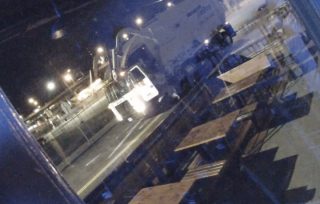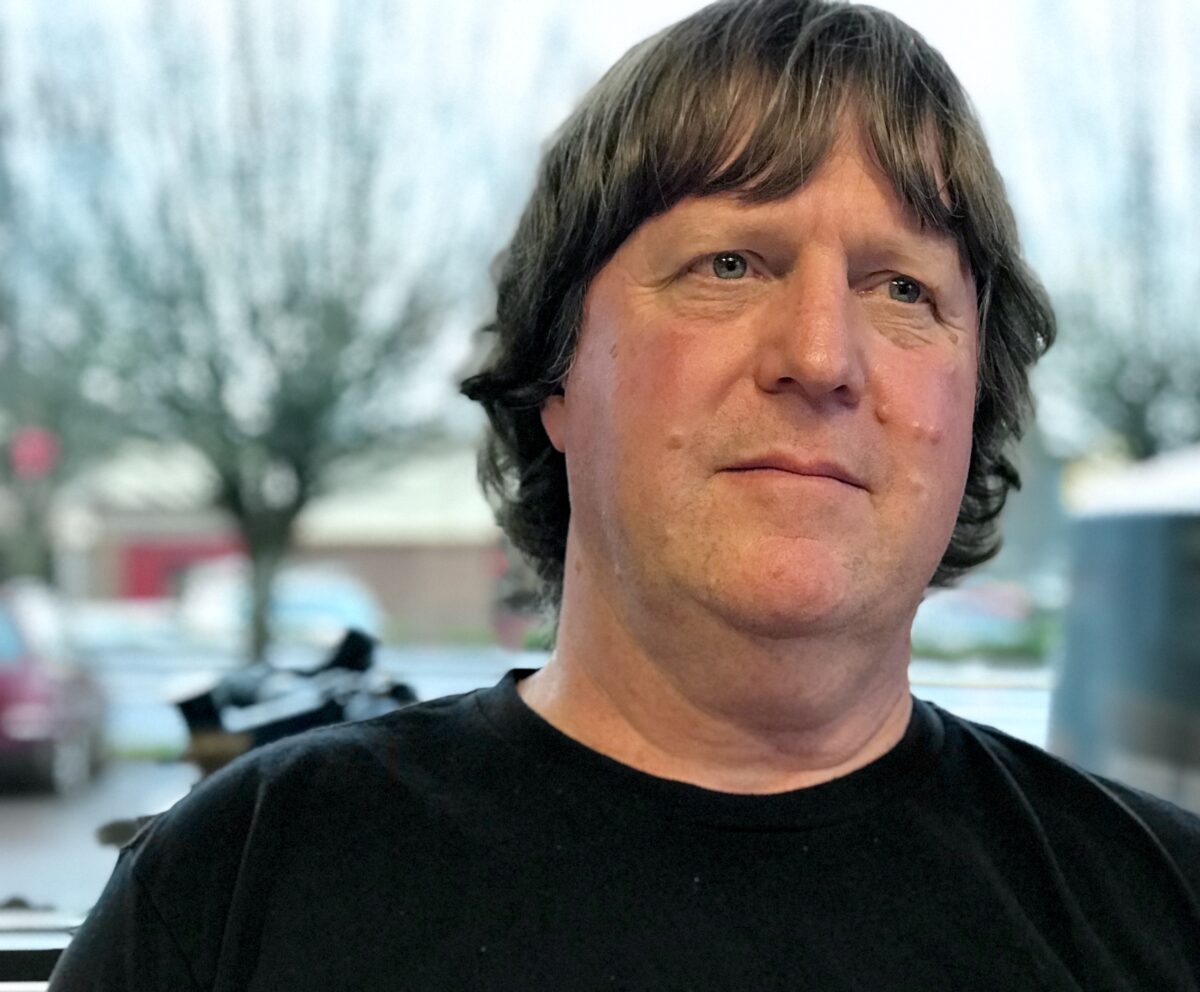In the early morning hours of August 21st, 2017, Paul Thompson was on his usual route picking up recycled cardboard from businesses in Portland’s central eastside industrial district. A truck driver for over three decades, Thompson had a spotless record before that morning.
After a stop to empty the bins at All Service Moving on Southeast Morrison, he drove south on Water Avenue. Then he turned left onto Taylor and his life changed forever.
In that intersection Thompson and his truck collided with 41-year-old Tamar Monhait, who was bicycling north on Water. She died from the impact.

Thompson’s truck just moments after the collision.
(Captured from video taken by Water Avenue Coffee)
In October 2018 I got an email from Thompson. He wanted to talk and share his side of the story. I met him yesterday at the Burgerville on Southeast 122nd near Parkrose High School, just a couple miles from his home in the Wilkes neighborhood of east Portland.
As Thompson shared his story he oscillated between a warm smile (he’s a jovial guy) and a voice that quivered with regret as his face fought away tears during heart-wrenching recollections.
“There are some things I probably did wrong,” he recalled, as he stared out into the grey January rain. Throughout our conversation I could tell he fully accepted his role in what happened.
He said would have never been at that intersection at that time on August 21st if it wasn’t for the total solar eclipse. He started his route early that day with hopes of getting home in time to snap photos of it. A fan of astronomy-related conspiracy theories and an avid listener to Coast to Coast, a popular radio talk show that covers them, Thompson said he was excited to see the eclipse.
But it’s what he didn’t see in the darkness that morning that haunts him to this day.
“I’m looking down the road, just looking for lights or movement. And I’m not seeing anything. I’m not on my phone or anything, just driving,” Thompson said, recounting what happened in the moments before impact. “I think I had my four-way flashers on and I put on my signal,” he added. Then he said he wasn’t sure if the signal stayed on for the turn. The way he tells it, Thompson didn’t make a smooth left turn. He admittedly turned a bit too early, then tried to correct his trajectory — and in that twisting motion he said his blinker might have switched off. Then another thing happened during that left turn. “And this is the weirdest thing,” Thompson recalled, “I get up to the corner of Taylor and Water — and I still thought it was perfectly clear and didn’t see anything — but there was a guy walking over here [on the sidewalk to his left near Bunk Sandwiches]. I wanted to make sure he wasn’t going to walk across the street. So I looked over at him, and I’m turning, and then I turned back and looked out the other window and I said, ‘Holy Fuck!’ here comes the bicyclist.”
In video of the collision captured from a nearby business, it’s clear Thompson’s truck ends up in the wrong lane (over the centerline) on Taylor. He said that happened because of a last-ditch effort to lessen the impact. “When I saw her I turned my wheel as far as I could to see if I could get out of her way. I saw her right in my window and I was trying to get the truck as far away from her as I could.”
It didn’t help. Monhait’s head struck the front of his truck and she died shortly thereafter.
Thompson remembers getting out of his truck and going to her side as she lay on the street. Then he started talking to her.
“This is gonna be in my head for the rest of my life.”
“I said, ‘Forgive me’. I was rubbing her leg, saying, ‘People are coming. Hang in there. Hang in there. I’m so sorry about this.’ I was tearing up quite a bit.”
In the video, you can see Thompson bolt out of his truck’s cab and run to Monhait — then run away. He did that twice, in what looked like frantic movements brought on by the blur of confusion that surrounds tragedy. Thompson explained to me yesterday that seeing Monhait on the ground instantly took him back to a day in 2009 when his wife died. “Tamar was the same age as my wife when she fell down our stairs and died from a head injury. It sent me visions from that day. So I ran away.”
Some time later, as he sat watching investigators go through the scene, a police officer walked up to him and informed him that Monhait had passed away. “I thought, oh my gosh… It’s just heartbreaking…heartbreaking.”
Several times in our conversation Thompson expressed regret for not making different decisions that morning. “Why didn’t I hit my air horn?” “Somehow I should have seen her before I made that turn.” “I want to turn back time and go straight.”
Thompson, now 56, was born in Nebraska. His father moved the family to Oregon when he was four. He has two kids, an 18-year-old son and 15-year-old daughter. He started driving garbage trucks in 1980 and used to have a route in the West Hills above Portland. He worked his way up to operations manager at one point, then realized management wasn’t for him and went back to being a driver.
After the crash, his employer (Republic Services) gave him paid time off. His company-provided attorney told him to not read comments about the crash on the Internet. “But I was at home doing nothing,” Thompson shared, “So of course I started reading them.” Thompson read comments from people who sympathized with him in The Oregonian. “On your site though,” he said. “Some people were very angry. Some said they should put me in jail.”
“I do care about people. I really cared about her. I tried to help her. I’m very sorry it happened and wish it didn’t happen. Not just cause of what’s happened to me, but what happened to her was the worst thing… she was too young.”
Thompson didn’t end up in jail. In the end he was charged with one traffic ticket for making a dangerous left turn (his lawyers got the failure to use a turn signal citation dismissed). The Multnomah County District Attorney declined to pursue a criminal case and he was never charged with Careless Driving so the Vulnerable Roadway User law — which would have given him a $12,500 fine, suspended license, and/or community service — wasn’t triggered.
A lawsuit filed by Monhait’s family was settled out of court. Republic allowed Thompson to come back to work a few months later; but not as a driver. He says they fired him unjustly in January 2018. “I think they just wanted to get rid of me,” he said. Getting fired meant he was unable to collect unemployment benefits. Thompson had trouble making ends meet before getting a job at another trash-hauling company, making substantially less per hour than he made at Republic.
Asked if he thinks justice has been served, Thompson said, “Yeah. I think so. I got a ticket. I lost my job. And no other place will hire me because of the incident. I’ve paid a price. I mean, I still feel terrible about it. I even prayed to my wife, ‘Can you find her and say God bless her and I’m sorry?’ This is gonna be in my head for the rest of my life.”
Before sitting down with him, I wondered what Thompson’s true motivation was for wanting to talk. In my 14 years doing this site I’ve never had the driver in a fatal collision reach out to me like this. I asked why he contacted me: “I just wanted to say my truth to people,” he explained, “I felt like I needed to share it with somebody and you seemed like the best person to share it with.’
I also asked him what he hoped would come from our meeting. “That I’m not a bad guy that doesn’t care about people,” he said. “I do care about people. I really cared about her. I tried to help her. I’m very sorry it happened and wish it didn’t happen. Not just cause of what’s happened to me, but what happened to her was the worst thing… she was too young.”
Five days after Monhait died, her friends held a vigil at the intersection. Thompson was there. He brought his son with him and they watched from afar. “I said to him, ‘This is where it happened. This is a terrible thing. Look how I hurt all these people. Her friends and all these artists.”
___
Before parting ways Thompson and I talked about how he could help improve road safety by becoming an advocate and speaking out to more people about his experience. He said he’d be happy to do that. Trucks like his claim far too many lives in Portland and we must do more to prevent a tragedy like this from happening again.
— Jonathan Maus: (503) 706-8804, @jonathan_maus on Twitter and jonathan@bikeportland.org
Never miss a story. Sign-up for the daily BP Headlines email.
BikePortland needs your support.
The post Truck driver Paul Thompson wants you to know he’s sorry for role in deadly crash appeared first on BikePortland.org.
from BikePortland.org http://bit.ly/2FpYJPi



No comments:
Post a Comment